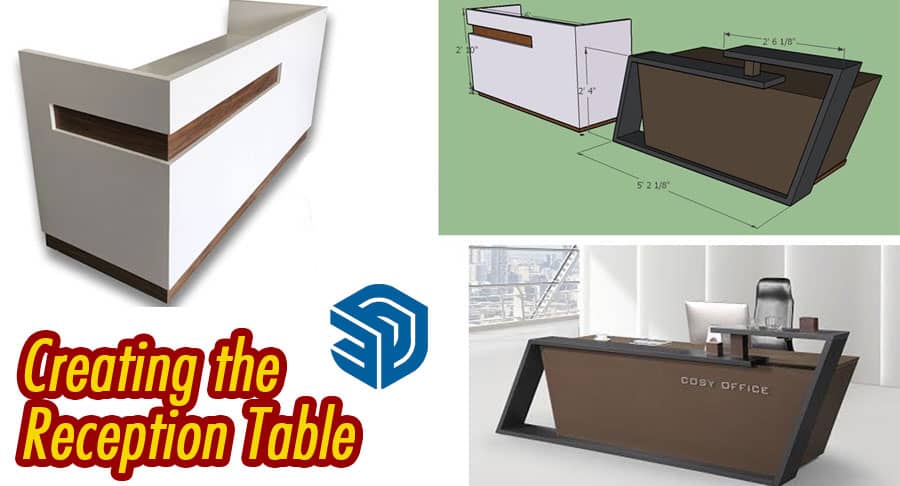SketchUp is a versatile 3D modeling software that allows users to create detailed and realistic designs. From architectural structures to interior décor, SketchUp empowers designers to visualize and bring their ideas to life with ease.
Understanding the Importance of a Reception Table
The reception area is the face of any establishment, be it an office, hotel, or retail space. The reception table serves as a focal point, setting the tone for the entire space. It’s not just a functional piece but a design element that speaks volumes about the organization’s style and ethos.
Benefits of Creating a Reception Table in SketchUp
- Visualizing Space and Layout: SketchUp enables designers to visualize how the reception table fits into the overall layout. It allows experimentation with various sizes, shapes, and placements to optimize space utilization.
- Customization and Design Options: The software offers a plethora of design tools, enabling customization to match specific aesthetics. From sleek modern designs to classic and ornate, SketchUp provides endless possibilities.
- Cost-Effectiveness and Efficiency: By creating the reception table virtually, designers can assess the design’s practicality and make necessary changes before the actual construction, saving both time and resources.
Step-by-Step Guide to Creating a Reception Table in SketchUp
- Gathering Initial Ideas and Inspirations: Before diving into SketchUp, gather inspirations, and sketch initial ideas. Consider the functionality, style, and dimensions needed.
- Setting Up SketchUp and Creating a New Project: Open SketchUp and start a new project. Set the appropriate measurements and begin sketching the basic structure of the reception table.
- Designing the Basic Structure: Utilize SketchUp’s tools to create the foundational structure. Experiment with shapes, edges, and dimensions to form the desired outline.
- Adding Detail and Customization: Once the basic structure is set, add intricate details, such as textures, finishes, and embellishments. This is where the design truly takes shape.
- Finalizing and Rendering: Review the design, make necessary adjustments, and render the final model. Visualize how the table looks from various angles.
Tips for Enhancing Your SketchUp Reception Table Design
- Playing with Textures and Materials: Experiment with different materials and textures to add depth and realism to the design. Wood, glass, metal – the options are vast.
- Utilizing Lighting Techniques: Incorporate lighting elements to highlight specific areas or create ambiance around the reception table.
- Incorporating Functional Elements: Consider adding practical elements like storage or wire management, blending functionality with aesthetics.
Sharing and Collaborating on SketchUp Designs
- Exporting and Sharing the Design: Export the design in various formats to share with clients, collaborators, or manufacturers.
- Collaborating with Others: SketchUp allows seamless collaboration, enabling multiple stakeholders to provide input and make modifications.
Design Iteration and Refinement
SketchUp allows for iterative design processes. Once the basic structure is set, take advantage of the software’s flexibility to experiment with different elements.
- Exploring Shapes and Forms: Try varying shapes, edges, and forms. SketchUp’s tools let you easily modify and refine these elements to achieve the desired look.
- Detailing and Finishing Touches: Detailing is where the design truly comes alive. From intricate carvings to sleek finishes, pay attention to every detail to create a visually appealing reception table.
Collaboration and Feedback
- Seeking Input and Feedback: Share your designs with colleagues, clients, or fellow designers. SketchUp’s collaborative features allow for seamless sharing and gathering of feedback.
- Incorporating Suggestions: Consider the input received and make necessary adjustments. SketchUp’s flexibility ensures these modifications can be made efficiently.
Finalizing the Design
- Rendering for Realism: Utilize rendering plugins or SketchUp’s built-in rendering capabilities to create realistic representations of the reception table.
- Presentation and Sharing: Prepare presentations or renders to effectively showcase the design to stakeholders. These visuals can aid in decision-making and approval processes.
Conclusion
Creating a reception table in SketchUp offers an efficient and creative approach to designing an impactful space. From conceptualization to sharing, the software streamlines the entire design process, ensuring a tailored and visually stunning end product.
For more information, please watch the video tutorial
Unique FAQs
Is SketchUp suitable for beginners in 3D modeling?
Absolutely! SketchUp’s user-friendly interface and intuitive tools make it accessible for beginners. There are plenty of tutorials and resources available to help novices get started and grow their skills.
Can SketchUp models be exported for use in other software?
Yes, SketchUp allows exporting models in various formats like DWG, DXF, and OBJ, making it compatible with other design and rendering software.
Are there limitations to the complexity of designs in SketchUp?
While SketchUp is robust, extremely intricate and complex designs might face some limitations due to hardware or software constraints. However, for most design needs, SketchUp offers ample capability.
How can lighting influence the perception of a reception table design?
Lighting plays a pivotal role in accentuating the reception table. It can highlight textures, create shadows, and evoke different moods. Properly placed lights can enhance the table’s aesthetics significantly.
What are the key factors to consider while designing a functional reception table in SketchUp?
Functionality, aesthetics, space utilization, and durability are crucial factors. The design should seamlessly integrate with the reception area’s overall theme while serving its purpose efficiently.


